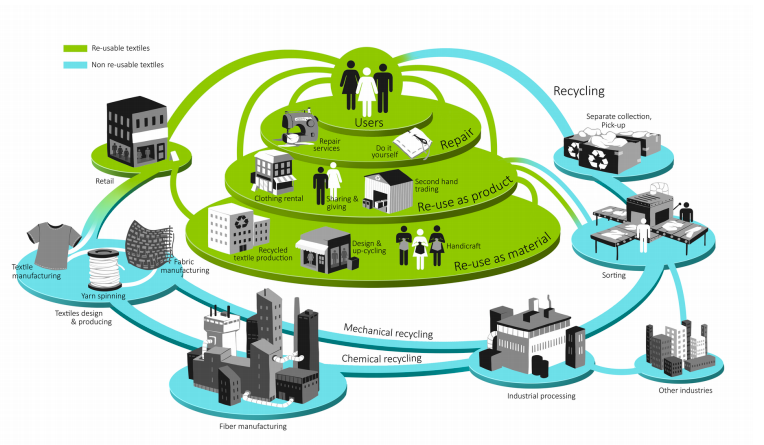A report published by Ecopreneur.eu – the European Sustainable Business Federation – urged textile producers to transform their production system from a linear to a circular model.
Funded by the C&A Foundation, the recently released report defines the waste and pollution from the production of textiles and clothing as “critical issues”. It also lays out a set of “five pillars“, policy instruments aimed at accelerating and mainstreaming a European circular fashion economy.
The Five Pillars
These five pillars are: innovation policies, economic incentives, regulation, trade policies and voluntary actions.
Specifically, innovation policies focus on research programmes with subsidies, investment tax deduction and support for technological development, innovation and small and medium-sized enterprises.
Economic incentives are aimed towards procurement, extended producer responsibility, VAT, and a tax shift to drive market demand for circular products and services.
Regulation looks at establishing and enforcing a common regulatory framework for transparency and traceability, circular design and improved end-of-waste status across the EU.
Trade policies aim at facilitating export of semi-finished products and sort reusable textile waste to producing countries, avoiding negative social impacts in countries that produce.

focus on material flows. Source: Ethica.
Credit: Ecopreneur.
Douwe Jan Joustra, head of circular transformation at C&A Foundation, explained: “Governmental policies create the rules by which companies and economies operate. Without an enabling policy framework, circular economy will never become mainstream. The intention of this report is to offer other organisations and the industry a baseline of policies from which to build on.”
He added that “with the support of C&A Foundation, Ecopreneur is also working to increase its cooperation with NGOs and other stakeholders, expand its European business network and support the fashion industry in creating a European circular economy policy strategy.”
A New Direction
Manfred Mühlberger, president of Ecopreneur added a clear, urgent call to action. He said: “Ecopreneur recommends to further develop the optimal policy mix into a detailed strategy for the sector’s advocacy and communicate the messages and actions listed in this report in a concerted action. We therefore call on the fashion industry to jointly work on this circular fashion advocacy agenda.”




